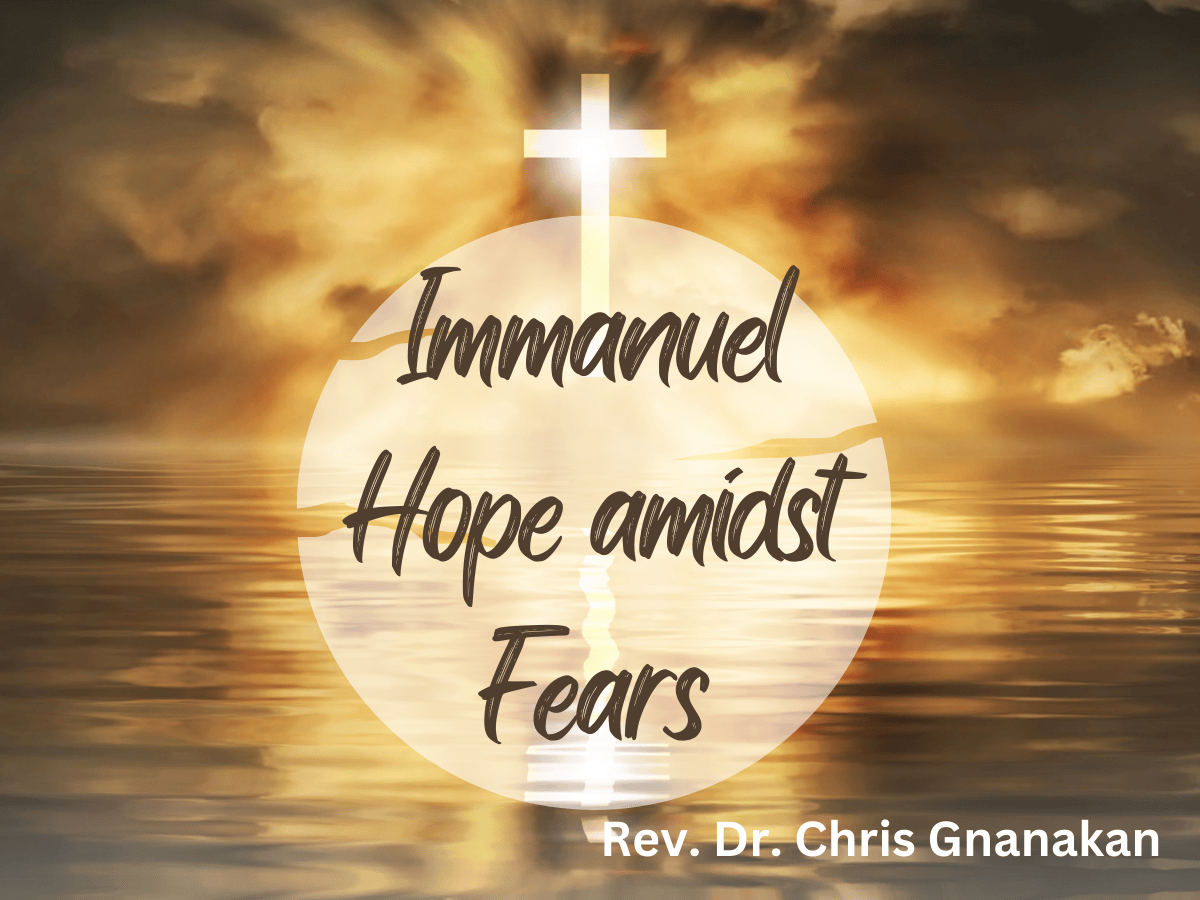
The two great fears that characterise our age are loneliness and despair. We have actively filled life with things that paradoxically leave us empty and disillusioned. Notice how we get what we want then don’t want what we got! we compare ourselves with others and find everything seems relative. We perennially crave for ‘something more’ hoping that ‘the next best thing’ would really satisfy. Our materialistic lifestyles can give us more to live with and less to live for. Today, we have some more time-saving gadgets but less time for leisure. We deny absolutes yet thirst for true meaning and purpose. We long for enduring relationships and if we find one, we become so possessive or protective of it, that this produces another kind of fear!
The Biblical account of creation clarifies two important truths about our human make up: we are created in divine likeness and for divine fellowship. God desires to share his life with us and has designed us to be whole only when we are in a proper relationship with him. The fact that our sinfulness separate us from God’s holiness, underlines our need for G
od’s loving and forgiving presence and our empty, restless lives in spite of possessions reveal this built-in need. That first Christmas, the name given to the Christ-child was ‘Immanuel’ which means ‘God is with us’ (Mt.1:23). More accurately, this prophetic title is descriptive of who Jesus is and what a relationship with him can bring: true companionship, comfort and community… The real need underlying our rat-race for fame and fortune is true companionship, security and significance.
The human life cycle demonstrates this. Infants cry to be with parents. Children want to play with and be accepted by friends their own age. Youth allow their peers to determine their self-worth. Young adults look out for a compatible “partner” and after marriage they develop unrealistic expectations of their spouses. The middle-aged want affirming colleagues with common interests. Some old folk would rather die baby-sitting their grand kids than be left alone. Put otherwise, we all hope for someone to share the gift of life with.
Immanuel = Companionship: ‘God is with us’ Whenever Israel, as God’s people, found themselves in trouble, God repeatedly promised them his presence. They were homeless and insecure as wilderness wanderers (Lev.26:11-12), powerless to enter their land or defeat their enemies. Then Moses exhorted them, ‘Do not be terrified by them, for the Lord your God, who is among you, is a great and awesome God’ (Deut.7:21).
They felt rejected exiled in Babylon yet in amidst socio-political fears they could hope for God’s deliverance and salvation. Upon their return, God reinforced his promise with the clear assurance, ‘I am with you’ (Hag.1:13;2:4). Immanuel = Comfort: ‘God is for us’ The second reality implicit in Jesus’ title ‘Immanuel’ is that this Almighty God who is with us is also for us. In the Hebrew IM-MENU-EL literally interpreted means the STRONG GOD WITH US. ‘Immanuel’ further assures us of God’s comfort or strengthening presence (in Latin, com= with, fort= strength).
It bears the hope of enduring grace for life’s trials or deliverance from afflictions. At any rate, there is a steadfast hope and no need to fear. Have you notice how many ‘fear nots’ there are in the Christmas story or the Bible for that matter! Immanuel is not merely about a past history or future assurance. It is a present reality! The almighty Redeemer is a present help in time of trouble. When we walk through the valley of death’s shadow we can say: ‘Thou art with me’ (Ps.23:4). In the thick of the battle against evil in the world, our flesh and the Devil we can be sure of victory. God being on our side, no powers visible or invisible can harm or separate us from his loyal love (Rom.8:31,35).
Immanuel = Community: ‘God is among us’ Finally, it is crucial to recognise Immanuel is not ‘God with me’ but, ‘God with us’. This indicates that Christians ‘together’ belong to a faith community wherein Immanuel signifies a mysterious yet profound truth: God incarnate among us, reconcilable to us, at peace with us, has taking us into covenant and communion with himself. The Christian doctrine of the Trinity teaches that God himself is community and manifests himself as community: Father, Son & Spirit.
The Spirit of Jesus makes us made members of one body. Christians are the Temple of God the Holy Spirit (1Cor.3:16). I am convinced that community is how God has structured human life and our social context is precisely where we learn to love God as we love our neighbour as ourselves. Our community has a catalytic role in shaping us into Christ’s likeness.
The wondrous benefit of the incarnation, God’s ultimate way of being Immanuel, was that without putting aside deity, God embraced our humanity and became accessible. Jesus reveals God, and as God offers forgiveness and eternal life. Immanuel will remain a mystery to the human mind, yet with John we can personally experience God in Jesus, the Word made flesh (Jn1:14; 1Jn1:1). When Paul was discouraged in ministry, Jesus reassured him with the words: ‘Don’t be afraid, I am with you’ (Acts 18:9). This promise holds good for us so that we can boldly say: ‘The Lord is my helper I will not be afraid. What can man do to me?” (Heb.13: 6) Knowing these truths about Immanuel will set us free (Jn.8:32) from sin to experiencing his love that casts away all fears (1Jn.4:18).
Author: Rev. Dr. Chris Gnanakan is Professor & HOD of Pastoral Theology & Counseling and the Dean of Chapel at SAIACS, Bangalore.


